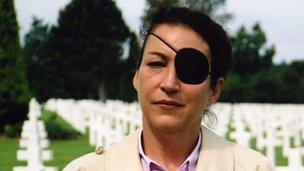Marie Colvin: A life 'defined by humanity'
- Published

┤¾¤¾┤½├¢ foreign correspondent Lyse Doucet described Marie Colvin as a woman of "guts and glamour"
It was a morning filled with warm memories of a woman described by her editor as the "greatest war correspondent of her generation".
The memorial service for Marie Colvin, the Sunday Times journalist killed in Syria last February, took place in a packed St Martin-in-the-Fields church in central London.
Ms Colvin was 56 when she was killed alongside the French photo-journalist Remi Ochlik, aged 29, in the Homs suburb of Baba Amr.
Leading figures from the worlds of media and politics joined Marie's friends and her family, led by her mother Rosemary, who had travelled from New York for the event.
The Foreign Secretary, William Hague, and his predecessor, David Miliband MP, were among those present.
The Reverend Richard Carter, who conducted the service, set the tone by describing Marie as someone whose life was "defined by humanitysomeone who gave a voice to the voiceless."
In her reflection ┤¾¤¾┤½├¢ foreign correspondent Lyse Doucet spoke of a woman who had "guts and glamour" and a great gift for friendship.
She spoke of travelling to Baba Amr, where Marie Colvin was killed, only last week but being unable to find the house where her friend had died under bombardment.
However in another part of Homs she had met a young man and asked him if he had met Marie.
"His face broke into a smile," recalled Ms Doucet. The young man then said of Marie: "She was so nice, she was so brave."
A poem written by Alan Jenkins, deputy editor of the Times Literary Supplement and a close friend of Marie, evoked the grief of those who knew her well.
How can you be lying there?
Immodestly, among the rubble
When we want you to be here
In some other kind of trouble
To warm laughter the editor of the Sunday Times, John Witherow, recalled how their relationship as editor and correspondent worked: "I would tell her what to do and she would do what she wanted."
Marie Colvin prided herself on giving her bosses the runaround and filed her copy late, he explained, because it didn't give editors time to "mess it up."
Ms Colvin was killed in Syria in February
But there was another side to this daring correspondent, said Mr Witherow. Anybody who visited her home was struck by the beauty of the art on display, he said. She had a knack for planting her garden so that it was always in bloom when she returned from the wars.
After losing her eye covering the conflict in Sri Lanka Marie had fallen into a depression which nearly caused her to give up war reporting. But she had been drawn back by the excitement of the Arab Spring whose upheavals she covered from Egypt to Libya and Syria.
"She was the greatest war correspondent of her generation," Mr Witherow said.
The service included the 1960s peace anthem 'Blowin in the Wind' by Bob Dylan, sung by the former lead singer of Catatonia. It was an appropriate anthem for the memorial of a woman devoted to conveying the suffering of the powerless.
Perhaps the most poignantly apposite words of the morning came in the poem 'Travel' by Edna St Vincent Millay, read by David Miliband.
My heart is warm with friends I make,
And better friends I'll not be knowing,
Yet there isn't a train I wouldn't take,
No matter where it's going.
- Published16 May 2012
- Published8 March 2012
- Published13 March 2012